Icon College: Sustainable and Responsible Tourism Management Report
VerifiedAdded on 2023/06/10
|14
|3824
|321
Report
AI Summary
This report delves into the core principles and practices of sustainable and responsible management within the tourism and hospitality sectors. It begins by defining sustainable tourism and outlining its key responsibilities, emphasizing the balance between economic, environmental, and social impacts. The report explores various examples, including accommodation providers, attractions, tour operators, and airlines, and discusses the UNWTO and UN Environment Programme's perspectives on sustainable tourism. The main body covers the principles of responsible tourism, highlighting the importance of minimizing negative impacts and maximizing benefits for local communities. It examines the role of destination-based tourism and hospitality organizations, analyzing their advantages and disadvantages, and discusses theories and principles of sustainable management, including resource utilization, waste reduction, biodiversity maintenance, and community involvement. The report also covers the challenges faced in implementing sustainable tourism approaches, such as labor standardization, marketing, and environmental preservation, while also exploring the economic benefits and policy implications of sustainable tourism, emphasizing the need for responsible practices across the entire industry.
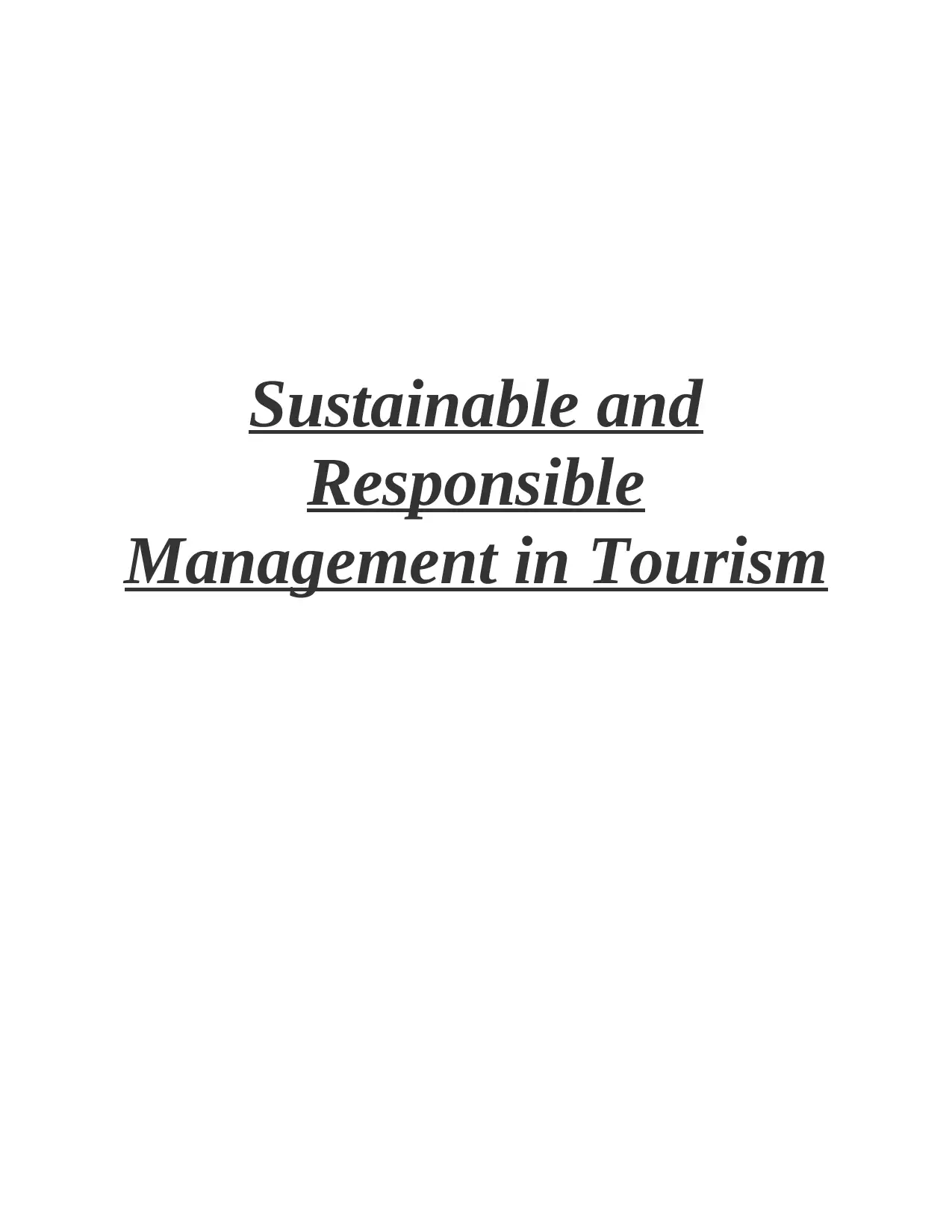
Sustainable and
Responsible
Management in Tourism
Responsible
Management in Tourism
Paraphrase This Document
Need a fresh take? Get an instant paraphrase of this document with our AI Paraphraser
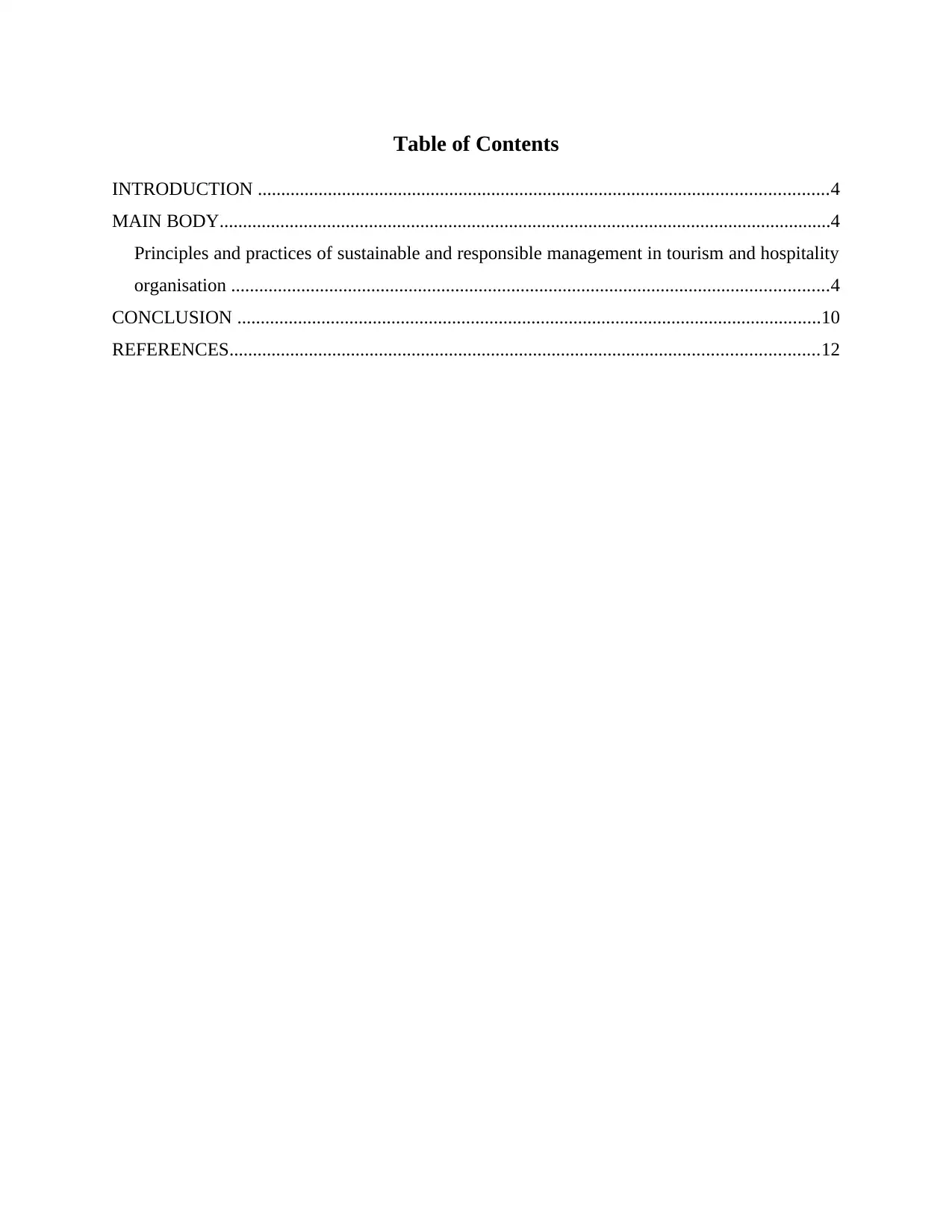
Table of Contents
INTRODUCTION ..........................................................................................................................4
MAIN BODY...................................................................................................................................4
Principles and practices of sustainable and responsible management in tourism and hospitality
organisation ................................................................................................................................4
CONCLUSION .............................................................................................................................10
REFERENCES..............................................................................................................................12
INTRODUCTION ..........................................................................................................................4
MAIN BODY...................................................................................................................................4
Principles and practices of sustainable and responsible management in tourism and hospitality
organisation ................................................................................................................................4
CONCLUSION .............................................................................................................................10
REFERENCES..............................................................................................................................12
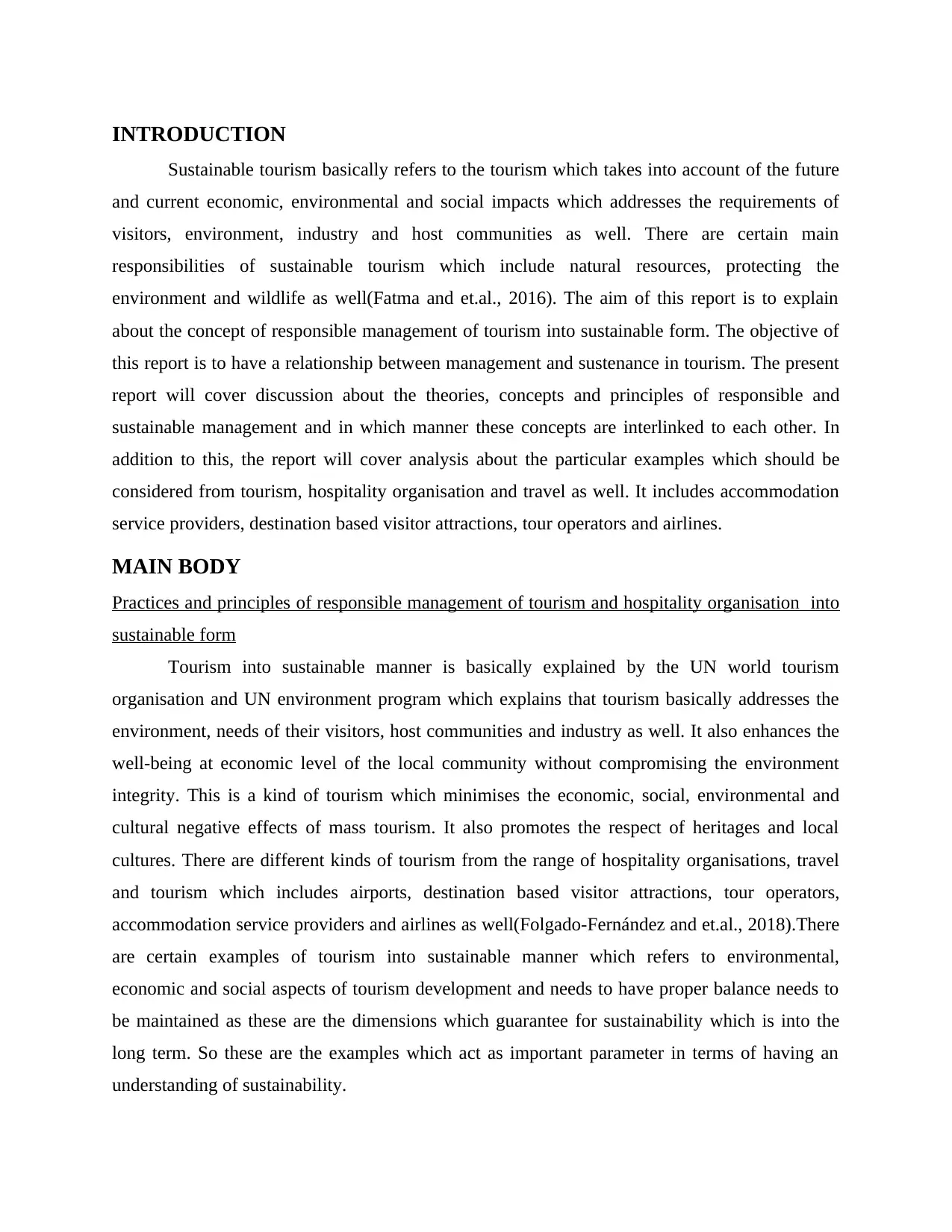
INTRODUCTION
Sustainable tourism basically refers to the tourism which takes into account of the future
and current economic, environmental and social impacts which addresses the requirements of
visitors, environment, industry and host communities as well. There are certain main
responsibilities of sustainable tourism which include natural resources, protecting the
environment and wildlife as well(Fatma and et.al., 2016). The aim of this report is to explain
about the concept of responsible management of tourism into sustainable form. The objective of
this report is to have a relationship between management and sustenance in tourism. The present
report will cover discussion about the theories, concepts and principles of responsible and
sustainable management and in which manner these concepts are interlinked to each other. In
addition to this, the report will cover analysis about the particular examples which should be
considered from tourism, hospitality organisation and travel as well. It includes accommodation
service providers, destination based visitor attractions, tour operators and airlines.
MAIN BODY
Practices and principles of responsible management of tourism and hospitality organisation into
sustainable form
Tourism into sustainable manner is basically explained by the UN world tourism
organisation and UN environment program which explains that tourism basically addresses the
environment, needs of their visitors, host communities and industry as well. It also enhances the
well-being at economic level of the local community without compromising the environment
integrity. This is a kind of tourism which minimises the economic, social, environmental and
cultural negative effects of mass tourism. It also promotes the respect of heritages and local
cultures. There are different kinds of tourism from the range of hospitality organisations, travel
and tourism which includes airports, destination based visitor attractions, tour operators,
accommodation service providers and airlines as well(Folgado-Fernández and et.al., 2018).There
are certain examples of tourism into sustainable manner which refers to environmental,
economic and social aspects of tourism development and needs to have proper balance needs to
be maintained as these are the dimensions which guarantee for sustainability which is into the
long term. So these are the examples which act as important parameter in terms of having an
understanding of sustainability.
Sustainable tourism basically refers to the tourism which takes into account of the future
and current economic, environmental and social impacts which addresses the requirements of
visitors, environment, industry and host communities as well. There are certain main
responsibilities of sustainable tourism which include natural resources, protecting the
environment and wildlife as well(Fatma and et.al., 2016). The aim of this report is to explain
about the concept of responsible management of tourism into sustainable form. The objective of
this report is to have a relationship between management and sustenance in tourism. The present
report will cover discussion about the theories, concepts and principles of responsible and
sustainable management and in which manner these concepts are interlinked to each other. In
addition to this, the report will cover analysis about the particular examples which should be
considered from tourism, hospitality organisation and travel as well. It includes accommodation
service providers, destination based visitor attractions, tour operators and airlines.
MAIN BODY
Practices and principles of responsible management of tourism and hospitality organisation into
sustainable form
Tourism into sustainable manner is basically explained by the UN world tourism
organisation and UN environment program which explains that tourism basically addresses the
environment, needs of their visitors, host communities and industry as well. It also enhances the
well-being at economic level of the local community without compromising the environment
integrity. This is a kind of tourism which minimises the economic, social, environmental and
cultural negative effects of mass tourism. It also promotes the respect of heritages and local
cultures. There are different kinds of tourism from the range of hospitality organisations, travel
and tourism which includes airports, destination based visitor attractions, tour operators,
accommodation service providers and airlines as well(Folgado-Fernández and et.al., 2018).There
are certain examples of tourism into sustainable manner which refers to environmental,
economic and social aspects of tourism development and needs to have proper balance needs to
be maintained as these are the dimensions which guarantee for sustainability which is into the
long term. So these are the examples which act as important parameter in terms of having an
understanding of sustainability.
⊘ This is a preview!⊘
Do you want full access?
Subscribe today to unlock all pages.

Trusted by 1+ million students worldwide
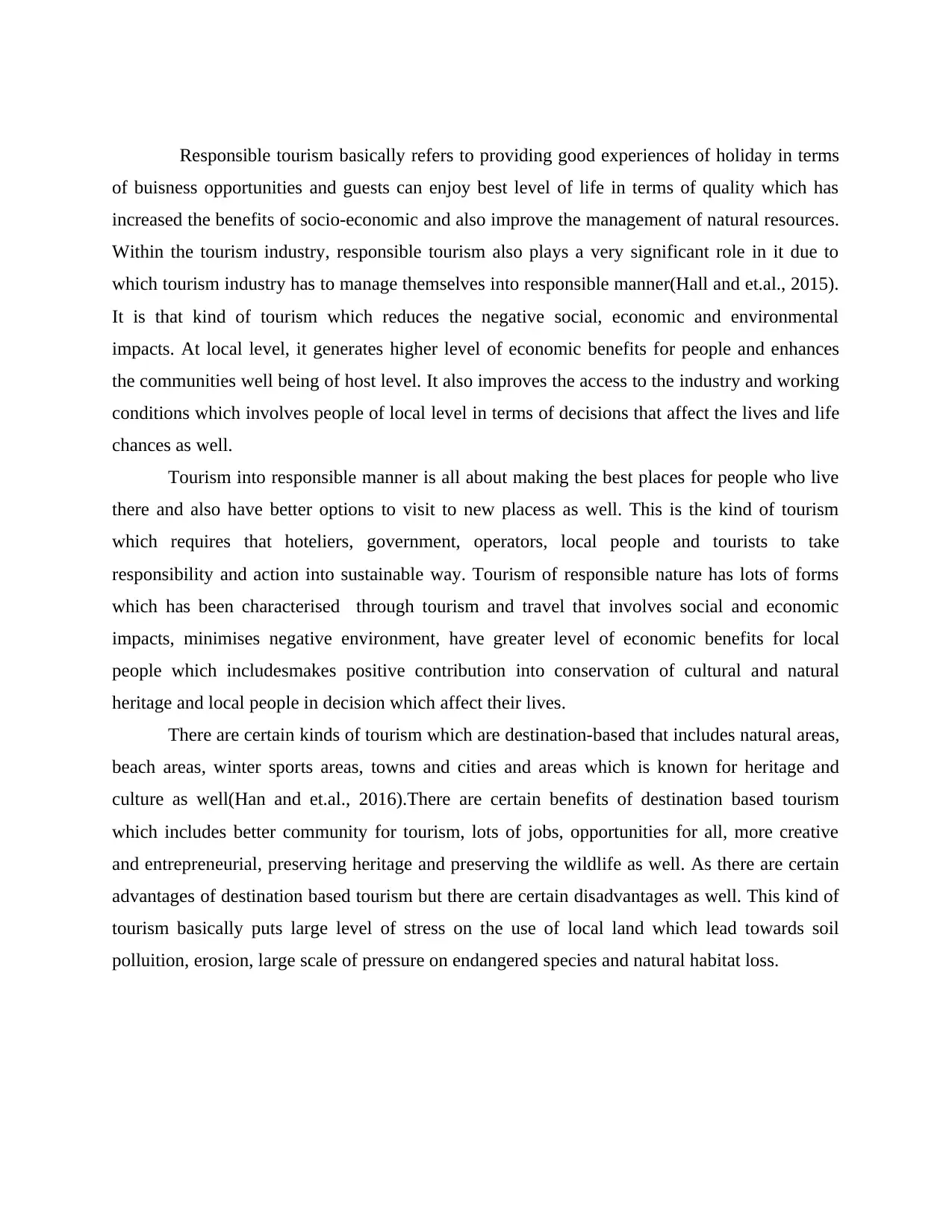
Responsible tourism basically refers to providing good experiences of holiday in terms
of buisness opportunities and guests can enjoy best level of life in terms of quality which has
increased the benefits of socio-economic and also improve the management of natural resources.
Within the tourism industry, responsible tourism also plays a very significant role in it due to
which tourism industry has to manage themselves into responsible manner(Hall and et.al., 2015).
It is that kind of tourism which reduces the negative social, economic and environmental
impacts. At local level, it generates higher level of economic benefits for people and enhances
the communities well being of host level. It also improves the access to the industry and working
conditions which involves people of local level in terms of decisions that affect the lives and life
chances as well.
Tourism into responsible manner is all about making the best places for people who live
there and also have better options to visit to new placess as well. This is the kind of tourism
which requires that hoteliers, government, operators, local people and tourists to take
responsibility and action into sustainable way. Tourism of responsible nature has lots of forms
which has been characterised through tourism and travel that involves social and economic
impacts, minimises negative environment, have greater level of economic benefits for local
people which includesmakes positive contribution into conservation of cultural and natural
heritage and local people in decision which affect their lives.
There are certain kinds of tourism which are destination-based that includes natural areas,
beach areas, winter sports areas, towns and cities and areas which is known for heritage and
culture as well(Han and et.al., 2016).There are certain benefits of destination based tourism
which includes better community for tourism, lots of jobs, opportunities for all, more creative
and entrepreneurial, preserving heritage and preserving the wildlife as well. As there are certain
advantages of destination based tourism but there are certain disadvantages as well. This kind of
tourism basically puts large level of stress on the use of local land which lead towards soil
polluition, erosion, large scale of pressure on endangered species and natural habitat loss.
of buisness opportunities and guests can enjoy best level of life in terms of quality which has
increased the benefits of socio-economic and also improve the management of natural resources.
Within the tourism industry, responsible tourism also plays a very significant role in it due to
which tourism industry has to manage themselves into responsible manner(Hall and et.al., 2015).
It is that kind of tourism which reduces the negative social, economic and environmental
impacts. At local level, it generates higher level of economic benefits for people and enhances
the communities well being of host level. It also improves the access to the industry and working
conditions which involves people of local level in terms of decisions that affect the lives and life
chances as well.
Tourism into responsible manner is all about making the best places for people who live
there and also have better options to visit to new placess as well. This is the kind of tourism
which requires that hoteliers, government, operators, local people and tourists to take
responsibility and action into sustainable way. Tourism of responsible nature has lots of forms
which has been characterised through tourism and travel that involves social and economic
impacts, minimises negative environment, have greater level of economic benefits for local
people which includesmakes positive contribution into conservation of cultural and natural
heritage and local people in decision which affect their lives.
There are certain kinds of tourism which are destination-based that includes natural areas,
beach areas, winter sports areas, towns and cities and areas which is known for heritage and
culture as well(Han and et.al., 2016).There are certain benefits of destination based tourism
which includes better community for tourism, lots of jobs, opportunities for all, more creative
and entrepreneurial, preserving heritage and preserving the wildlife as well. As there are certain
advantages of destination based tourism but there are certain disadvantages as well. This kind of
tourism basically puts large level of stress on the use of local land which lead towards soil
polluition, erosion, large scale of pressure on endangered species and natural habitat loss.
Paraphrase This Document
Need a fresh take? Get an instant paraphrase of this document with our AI Paraphraser
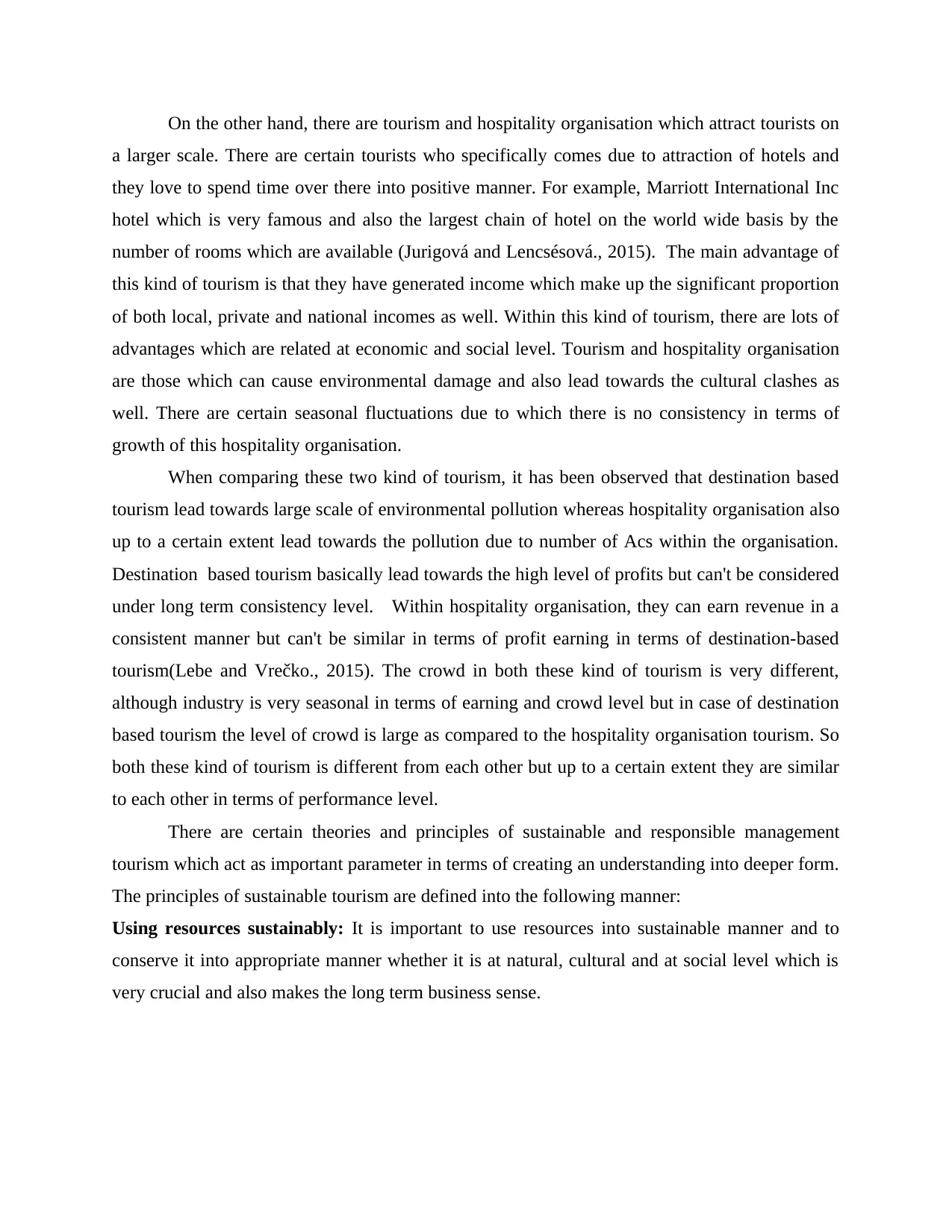
On the other hand, there are tourism and hospitality organisation which attract tourists on
a larger scale. There are certain tourists who specifically comes due to attraction of hotels and
they love to spend time over there into positive manner. For example, Marriott International Inc
hotel which is very famous and also the largest chain of hotel on the world wide basis by the
number of rooms which are available (Jurigová and Lencsésová., 2015). The main advantage of
this kind of tourism is that they have generated income which make up the significant proportion
of both local, private and national incomes as well. Within this kind of tourism, there are lots of
advantages which are related at economic and social level. Tourism and hospitality organisation
are those which can cause environmental damage and also lead towards the cultural clashes as
well. There are certain seasonal fluctuations due to which there is no consistency in terms of
growth of this hospitality organisation.
When comparing these two kind of tourism, it has been observed that destination based
tourism lead towards large scale of environmental pollution whereas hospitality organisation also
up to a certain extent lead towards the pollution due to number of Acs within the organisation.
Destination based tourism basically lead towards the high level of profits but can't be considered
under long term consistency level. Within hospitality organisation, they can earn revenue in a
consistent manner but can't be similar in terms of profit earning in terms of destination-based
tourism(Lebe and Vrečko., 2015). The crowd in both these kind of tourism is very different,
although industry is very seasonal in terms of earning and crowd level but in case of destination
based tourism the level of crowd is large as compared to the hospitality organisation tourism. So
both these kind of tourism is different from each other but up to a certain extent they are similar
to each other in terms of performance level.
There are certain theories and principles of sustainable and responsible management
tourism which act as important parameter in terms of creating an understanding into deeper form.
The principles of sustainable tourism are defined into the following manner:
Using resources sustainably: It is important to use resources into sustainable manner and to
conserve it into appropriate manner whether it is at natural, cultural and at social level which is
very crucial and also makes the long term business sense.
a larger scale. There are certain tourists who specifically comes due to attraction of hotels and
they love to spend time over there into positive manner. For example, Marriott International Inc
hotel which is very famous and also the largest chain of hotel on the world wide basis by the
number of rooms which are available (Jurigová and Lencsésová., 2015). The main advantage of
this kind of tourism is that they have generated income which make up the significant proportion
of both local, private and national incomes as well. Within this kind of tourism, there are lots of
advantages which are related at economic and social level. Tourism and hospitality organisation
are those which can cause environmental damage and also lead towards the cultural clashes as
well. There are certain seasonal fluctuations due to which there is no consistency in terms of
growth of this hospitality organisation.
When comparing these two kind of tourism, it has been observed that destination based
tourism lead towards large scale of environmental pollution whereas hospitality organisation also
up to a certain extent lead towards the pollution due to number of Acs within the organisation.
Destination based tourism basically lead towards the high level of profits but can't be considered
under long term consistency level. Within hospitality organisation, they can earn revenue in a
consistent manner but can't be similar in terms of profit earning in terms of destination-based
tourism(Lebe and Vrečko., 2015). The crowd in both these kind of tourism is very different,
although industry is very seasonal in terms of earning and crowd level but in case of destination
based tourism the level of crowd is large as compared to the hospitality organisation tourism. So
both these kind of tourism is different from each other but up to a certain extent they are similar
to each other in terms of performance level.
There are certain theories and principles of sustainable and responsible management
tourism which act as important parameter in terms of creating an understanding into deeper form.
The principles of sustainable tourism are defined into the following manner:
Using resources sustainably: It is important to use resources into sustainable manner and to
conserve it into appropriate manner whether it is at natural, cultural and at social level which is
very crucial and also makes the long term business sense.
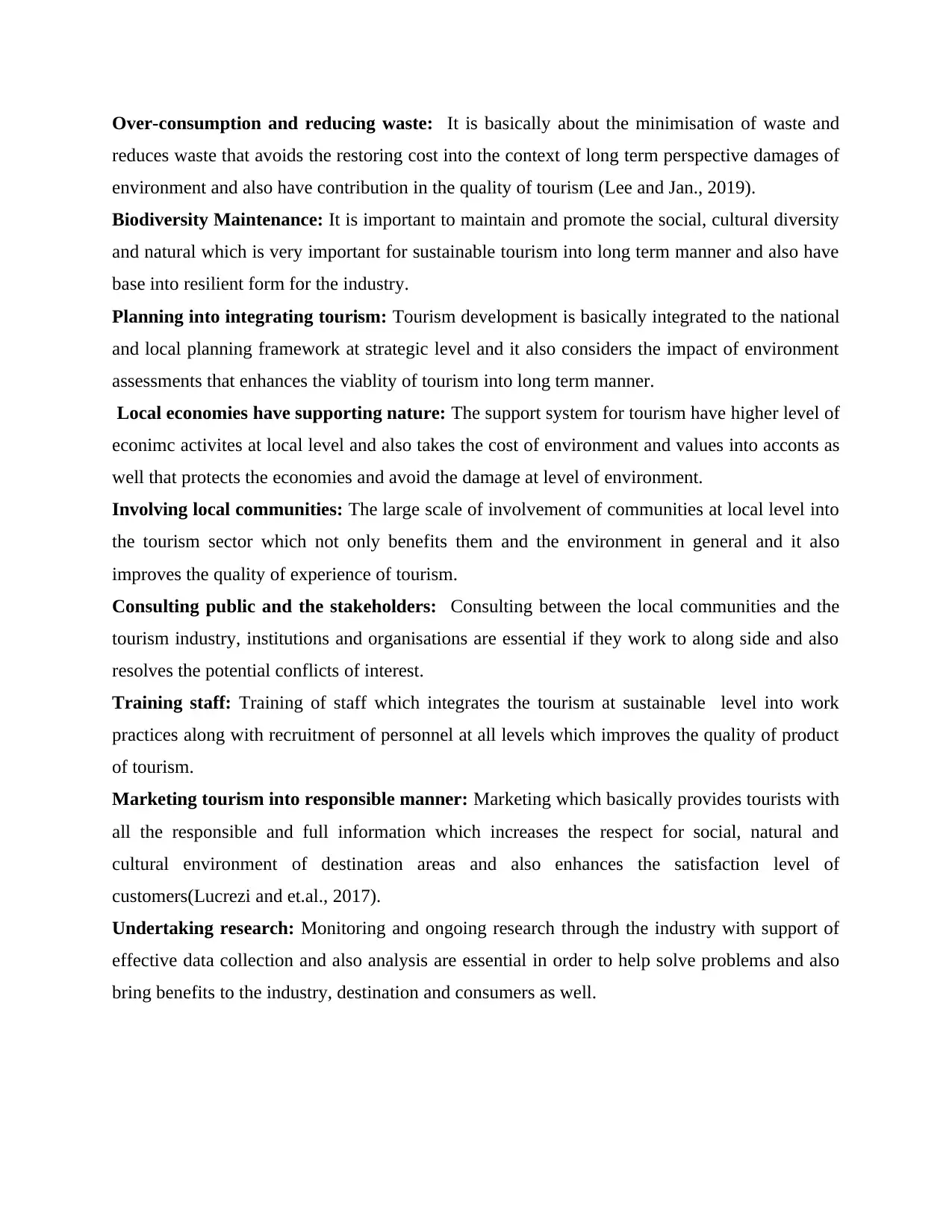
Over-consumption and reducing waste: It is basically about the minimisation of waste and
reduces waste that avoids the restoring cost into the context of long term perspective damages of
environment and also have contribution in the quality of tourism (Lee and Jan., 2019).
Biodiversity Maintenance: It is important to maintain and promote the social, cultural diversity
and natural which is very important for sustainable tourism into long term manner and also have
base into resilient form for the industry.
Planning into integrating tourism: Tourism development is basically integrated to the national
and local planning framework at strategic level and it also considers the impact of environment
assessments that enhances the viablity of tourism into long term manner.
Local economies have supporting nature: The support system for tourism have higher level of
econimc activites at local level and also takes the cost of environment and values into acconts as
well that protects the economies and avoid the damage at level of environment.
Involving local communities: The large scale of involvement of communities at local level into
the tourism sector which not only benefits them and the environment in general and it also
improves the quality of experience of tourism.
Consulting public and the stakeholders: Consulting between the local communities and the
tourism industry, institutions and organisations are essential if they work to along side and also
resolves the potential conflicts of interest.
Training staff: Training of staff which integrates the tourism at sustainable level into work
practices along with recruitment of personnel at all levels which improves the quality of product
of tourism.
Marketing tourism into responsible manner: Marketing which basically provides tourists with
all the responsible and full information which increases the respect for social, natural and
cultural environment of destination areas and also enhances the satisfaction level of
customers(Lucrezi and et.al., 2017).
Undertaking research: Monitoring and ongoing research through the industry with support of
effective data collection and also analysis are essential in order to help solve problems and also
bring benefits to the industry, destination and consumers as well.
reduces waste that avoids the restoring cost into the context of long term perspective damages of
environment and also have contribution in the quality of tourism (Lee and Jan., 2019).
Biodiversity Maintenance: It is important to maintain and promote the social, cultural diversity
and natural which is very important for sustainable tourism into long term manner and also have
base into resilient form for the industry.
Planning into integrating tourism: Tourism development is basically integrated to the national
and local planning framework at strategic level and it also considers the impact of environment
assessments that enhances the viablity of tourism into long term manner.
Local economies have supporting nature: The support system for tourism have higher level of
econimc activites at local level and also takes the cost of environment and values into acconts as
well that protects the economies and avoid the damage at level of environment.
Involving local communities: The large scale of involvement of communities at local level into
the tourism sector which not only benefits them and the environment in general and it also
improves the quality of experience of tourism.
Consulting public and the stakeholders: Consulting between the local communities and the
tourism industry, institutions and organisations are essential if they work to along side and also
resolves the potential conflicts of interest.
Training staff: Training of staff which integrates the tourism at sustainable level into work
practices along with recruitment of personnel at all levels which improves the quality of product
of tourism.
Marketing tourism into responsible manner: Marketing which basically provides tourists with
all the responsible and full information which increases the respect for social, natural and
cultural environment of destination areas and also enhances the satisfaction level of
customers(Lucrezi and et.al., 2017).
Undertaking research: Monitoring and ongoing research through the industry with support of
effective data collection and also analysis are essential in order to help solve problems and also
bring benefits to the industry, destination and consumers as well.
⊘ This is a preview!⊘
Do you want full access?
Subscribe today to unlock all pages.

Trusted by 1+ million students worldwide
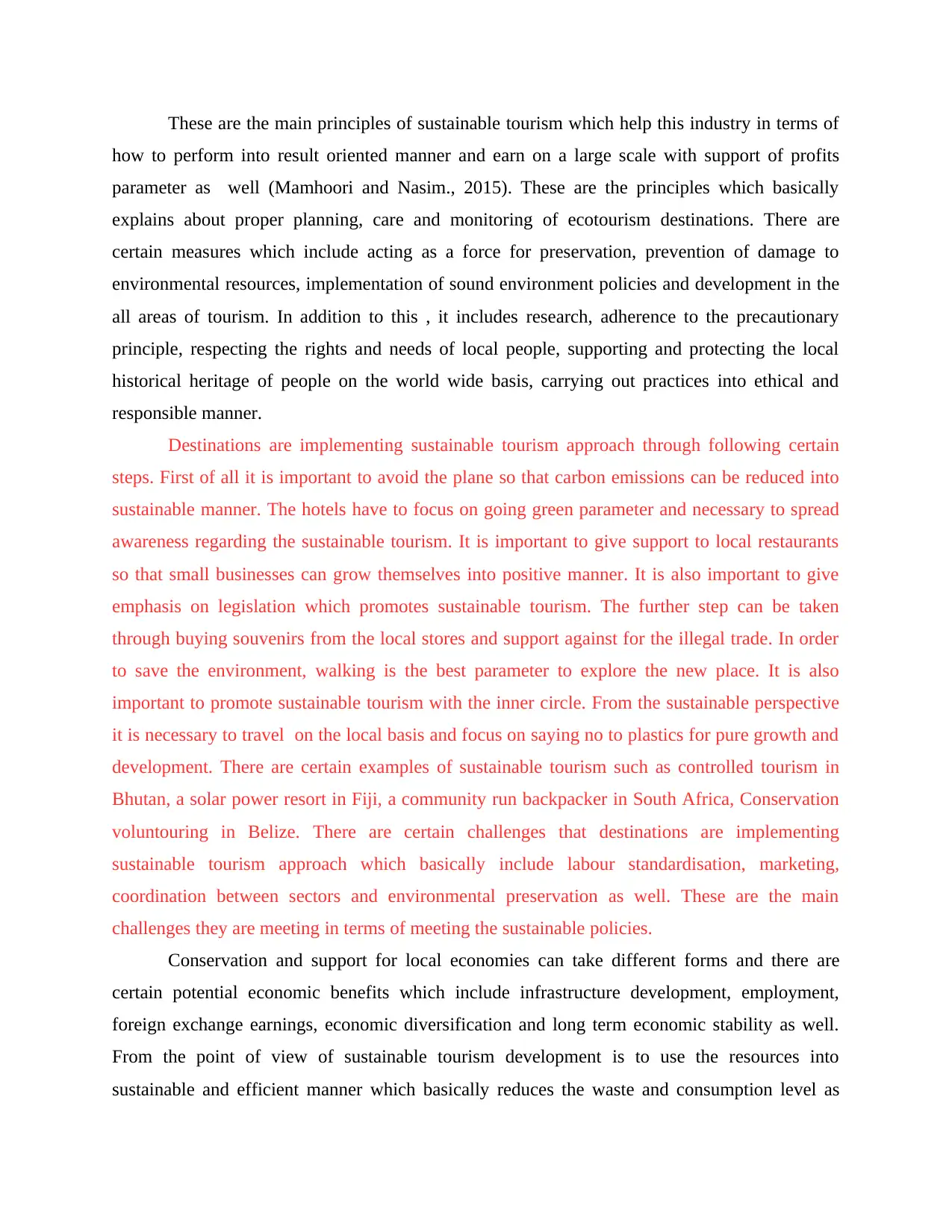
These are the main principles of sustainable tourism which help this industry in terms of
how to perform into result oriented manner and earn on a large scale with support of profits
parameter as well (Mamhoori and Nasim., 2015). These are the principles which basically
explains about proper planning, care and monitoring of ecotourism destinations. There are
certain measures which include acting as a force for preservation, prevention of damage to
environmental resources, implementation of sound environment policies and development in the
all areas of tourism. In addition to this , it includes research, adherence to the precautionary
principle, respecting the rights and needs of local people, supporting and protecting the local
historical heritage of people on the world wide basis, carrying out practices into ethical and
responsible manner.
Destinations are implementing sustainable tourism approach through following certain
steps. First of all it is important to avoid the plane so that carbon emissions can be reduced into
sustainable manner. The hotels have to focus on going green parameter and necessary to spread
awareness regarding the sustainable tourism. It is important to give support to local restaurants
so that small businesses can grow themselves into positive manner. It is also important to give
emphasis on legislation which promotes sustainable tourism. The further step can be taken
through buying souvenirs from the local stores and support against for the illegal trade. In order
to save the environment, walking is the best parameter to explore the new place. It is also
important to promote sustainable tourism with the inner circle. From the sustainable perspective
it is necessary to travel on the local basis and focus on saying no to plastics for pure growth and
development. There are certain examples of sustainable tourism such as controlled tourism in
Bhutan, a solar power resort in Fiji, a community run backpacker in South Africa, Conservation
voluntouring in Belize. There are certain challenges that destinations are implementing
sustainable tourism approach which basically include labour standardisation, marketing,
coordination between sectors and environmental preservation as well. These are the main
challenges they are meeting in terms of meeting the sustainable policies.
Conservation and support for local economies can take different forms and there are
certain potential economic benefits which include infrastructure development, employment,
foreign exchange earnings, economic diversification and long term economic stability as well.
From the point of view of sustainable tourism development is to use the resources into
sustainable and efficient manner which basically reduces the waste and consumption level as
how to perform into result oriented manner and earn on a large scale with support of profits
parameter as well (Mamhoori and Nasim., 2015). These are the principles which basically
explains about proper planning, care and monitoring of ecotourism destinations. There are
certain measures which include acting as a force for preservation, prevention of damage to
environmental resources, implementation of sound environment policies and development in the
all areas of tourism. In addition to this , it includes research, adherence to the precautionary
principle, respecting the rights and needs of local people, supporting and protecting the local
historical heritage of people on the world wide basis, carrying out practices into ethical and
responsible manner.
Destinations are implementing sustainable tourism approach through following certain
steps. First of all it is important to avoid the plane so that carbon emissions can be reduced into
sustainable manner. The hotels have to focus on going green parameter and necessary to spread
awareness regarding the sustainable tourism. It is important to give support to local restaurants
so that small businesses can grow themselves into positive manner. It is also important to give
emphasis on legislation which promotes sustainable tourism. The further step can be taken
through buying souvenirs from the local stores and support against for the illegal trade. In order
to save the environment, walking is the best parameter to explore the new place. It is also
important to promote sustainable tourism with the inner circle. From the sustainable perspective
it is necessary to travel on the local basis and focus on saying no to plastics for pure growth and
development. There are certain examples of sustainable tourism such as controlled tourism in
Bhutan, a solar power resort in Fiji, a community run backpacker in South Africa, Conservation
voluntouring in Belize. There are certain challenges that destinations are implementing
sustainable tourism approach which basically include labour standardisation, marketing,
coordination between sectors and environmental preservation as well. These are the main
challenges they are meeting in terms of meeting the sustainable policies.
Conservation and support for local economies can take different forms and there are
certain potential economic benefits which include infrastructure development, employment,
foreign exchange earnings, economic diversification and long term economic stability as well.
From the point of view of sustainable tourism development is to use the resources into
sustainable and efficient manner which basically reduces the waste and consumption level as
Paraphrase This Document
Need a fresh take? Get an instant paraphrase of this document with our AI Paraphraser
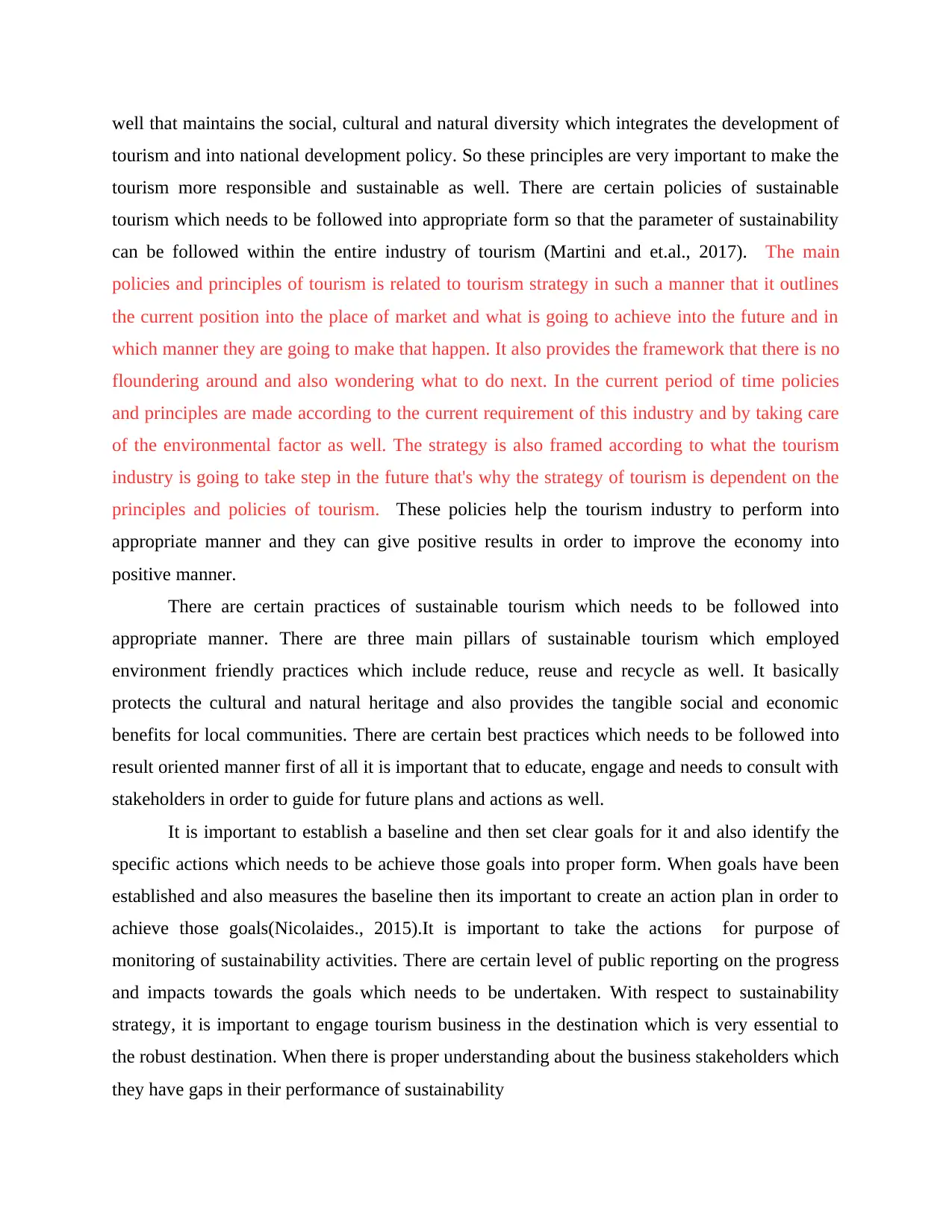
well that maintains the social, cultural and natural diversity which integrates the development of
tourism and into national development policy. So these principles are very important to make the
tourism more responsible and sustainable as well. There are certain policies of sustainable
tourism which needs to be followed into appropriate form so that the parameter of sustainability
can be followed within the entire industry of tourism (Martini and et.al., 2017). The main
policies and principles of tourism is related to tourism strategy in such a manner that it outlines
the current position into the place of market and what is going to achieve into the future and in
which manner they are going to make that happen. It also provides the framework that there is no
floundering around and also wondering what to do next. In the current period of time policies
and principles are made according to the current requirement of this industry and by taking care
of the environmental factor as well. The strategy is also framed according to what the tourism
industry is going to take step in the future that's why the strategy of tourism is dependent on the
principles and policies of tourism. These policies help the tourism industry to perform into
appropriate manner and they can give positive results in order to improve the economy into
positive manner.
There are certain practices of sustainable tourism which needs to be followed into
appropriate manner. There are three main pillars of sustainable tourism which employed
environment friendly practices which include reduce, reuse and recycle as well. It basically
protects the cultural and natural heritage and also provides the tangible social and economic
benefits for local communities. There are certain best practices which needs to be followed into
result oriented manner first of all it is important that to educate, engage and needs to consult with
stakeholders in order to guide for future plans and actions as well.
It is important to establish a baseline and then set clear goals for it and also identify the
specific actions which needs to be achieve those goals into proper form. When goals have been
established and also measures the baseline then its important to create an action plan in order to
achieve those goals(Nicolaides., 2015).It is important to take the actions for purpose of
monitoring of sustainability activities. There are certain level of public reporting on the progress
and impacts towards the goals which needs to be undertaken. With respect to sustainability
strategy, it is important to engage tourism business in the destination which is very essential to
the robust destination. When there is proper understanding about the business stakeholders which
they have gaps in their performance of sustainability
tourism and into national development policy. So these principles are very important to make the
tourism more responsible and sustainable as well. There are certain policies of sustainable
tourism which needs to be followed into appropriate form so that the parameter of sustainability
can be followed within the entire industry of tourism (Martini and et.al., 2017). The main
policies and principles of tourism is related to tourism strategy in such a manner that it outlines
the current position into the place of market and what is going to achieve into the future and in
which manner they are going to make that happen. It also provides the framework that there is no
floundering around and also wondering what to do next. In the current period of time policies
and principles are made according to the current requirement of this industry and by taking care
of the environmental factor as well. The strategy is also framed according to what the tourism
industry is going to take step in the future that's why the strategy of tourism is dependent on the
principles and policies of tourism. These policies help the tourism industry to perform into
appropriate manner and they can give positive results in order to improve the economy into
positive manner.
There are certain practices of sustainable tourism which needs to be followed into
appropriate manner. There are three main pillars of sustainable tourism which employed
environment friendly practices which include reduce, reuse and recycle as well. It basically
protects the cultural and natural heritage and also provides the tangible social and economic
benefits for local communities. There are certain best practices which needs to be followed into
result oriented manner first of all it is important that to educate, engage and needs to consult with
stakeholders in order to guide for future plans and actions as well.
It is important to establish a baseline and then set clear goals for it and also identify the
specific actions which needs to be achieve those goals into proper form. When goals have been
established and also measures the baseline then its important to create an action plan in order to
achieve those goals(Nicolaides., 2015).It is important to take the actions for purpose of
monitoring of sustainability activities. There are certain level of public reporting on the progress
and impacts towards the goals which needs to be undertaken. With respect to sustainability
strategy, it is important to engage tourism business in the destination which is very essential to
the robust destination. When there is proper understanding about the business stakeholders which
they have gaps in their performance of sustainability
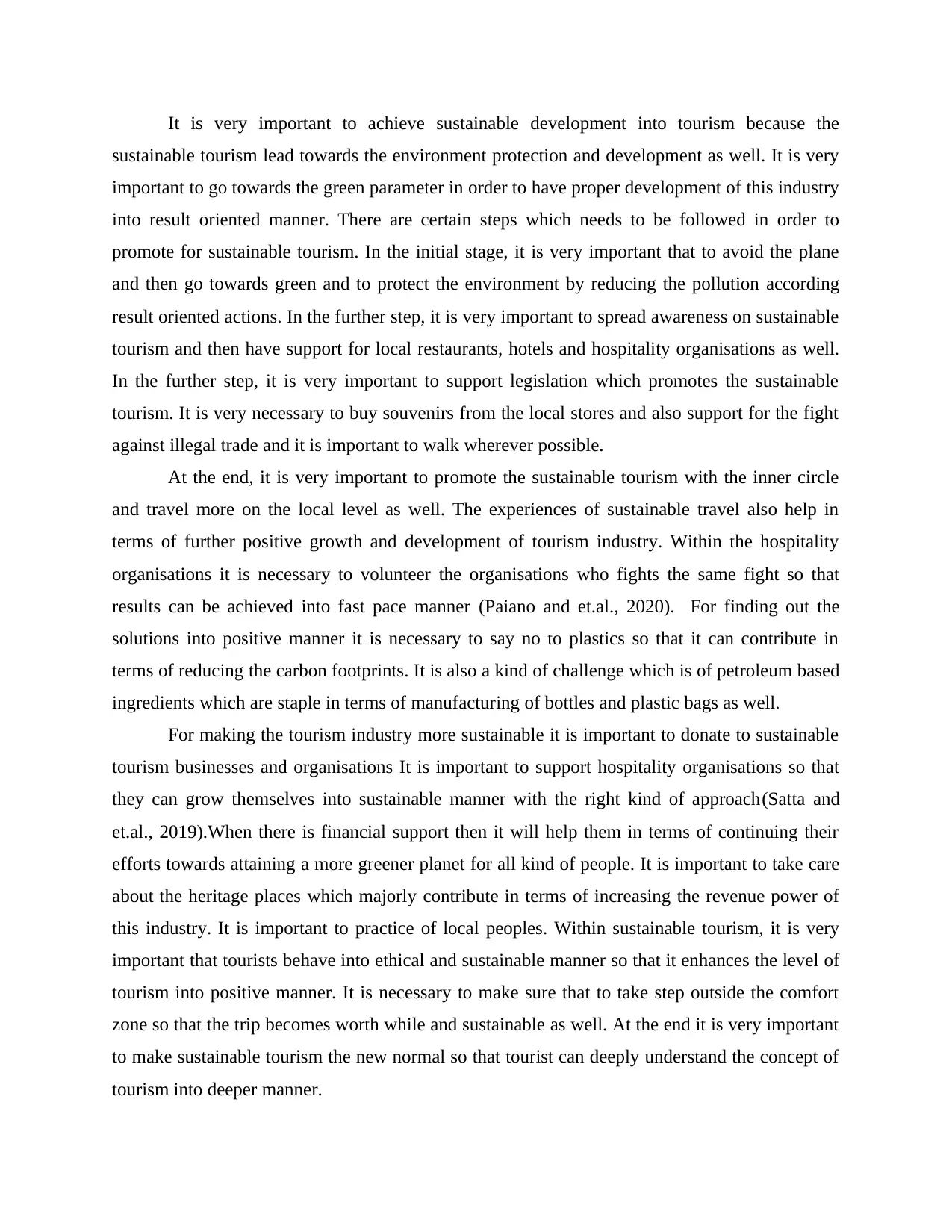
It is very important to achieve sustainable development into tourism because the
sustainable tourism lead towards the environment protection and development as well. It is very
important to go towards the green parameter in order to have proper development of this industry
into result oriented manner. There are certain steps which needs to be followed in order to
promote for sustainable tourism. In the initial stage, it is very important that to avoid the plane
and then go towards green and to protect the environment by reducing the pollution according
result oriented actions. In the further step, it is very important to spread awareness on sustainable
tourism and then have support for local restaurants, hotels and hospitality organisations as well.
In the further step, it is very important to support legislation which promotes the sustainable
tourism. It is very necessary to buy souvenirs from the local stores and also support for the fight
against illegal trade and it is important to walk wherever possible.
At the end, it is very important to promote the sustainable tourism with the inner circle
and travel more on the local level as well. The experiences of sustainable travel also help in
terms of further positive growth and development of tourism industry. Within the hospitality
organisations it is necessary to volunteer the organisations who fights the same fight so that
results can be achieved into fast pace manner (Paiano and et.al., 2020). For finding out the
solutions into positive manner it is necessary to say no to plastics so that it can contribute in
terms of reducing the carbon footprints. It is also a kind of challenge which is of petroleum based
ingredients which are staple in terms of manufacturing of bottles and plastic bags as well.
For making the tourism industry more sustainable it is important to donate to sustainable
tourism businesses and organisations It is important to support hospitality organisations so that
they can grow themselves into sustainable manner with the right kind of approach(Satta and
et.al., 2019).When there is financial support then it will help them in terms of continuing their
efforts towards attaining a more greener planet for all kind of people. It is important to take care
about the heritage places which majorly contribute in terms of increasing the revenue power of
this industry. It is important to practice of local peoples. Within sustainable tourism, it is very
important that tourists behave into ethical and sustainable manner so that it enhances the level of
tourism into positive manner. It is necessary to make sure that to take step outside the comfort
zone so that the trip becomes worth while and sustainable as well. At the end it is very important
to make sustainable tourism the new normal so that tourist can deeply understand the concept of
tourism into deeper manner.
sustainable tourism lead towards the environment protection and development as well. It is very
important to go towards the green parameter in order to have proper development of this industry
into result oriented manner. There are certain steps which needs to be followed in order to
promote for sustainable tourism. In the initial stage, it is very important that to avoid the plane
and then go towards green and to protect the environment by reducing the pollution according
result oriented actions. In the further step, it is very important to spread awareness on sustainable
tourism and then have support for local restaurants, hotels and hospitality organisations as well.
In the further step, it is very important to support legislation which promotes the sustainable
tourism. It is very necessary to buy souvenirs from the local stores and also support for the fight
against illegal trade and it is important to walk wherever possible.
At the end, it is very important to promote the sustainable tourism with the inner circle
and travel more on the local level as well. The experiences of sustainable travel also help in
terms of further positive growth and development of tourism industry. Within the hospitality
organisations it is necessary to volunteer the organisations who fights the same fight so that
results can be achieved into fast pace manner (Paiano and et.al., 2020). For finding out the
solutions into positive manner it is necessary to say no to plastics so that it can contribute in
terms of reducing the carbon footprints. It is also a kind of challenge which is of petroleum based
ingredients which are staple in terms of manufacturing of bottles and plastic bags as well.
For making the tourism industry more sustainable it is important to donate to sustainable
tourism businesses and organisations It is important to support hospitality organisations so that
they can grow themselves into sustainable manner with the right kind of approach(Satta and
et.al., 2019).When there is financial support then it will help them in terms of continuing their
efforts towards attaining a more greener planet for all kind of people. It is important to take care
about the heritage places which majorly contribute in terms of increasing the revenue power of
this industry. It is important to practice of local peoples. Within sustainable tourism, it is very
important that tourists behave into ethical and sustainable manner so that it enhances the level of
tourism into positive manner. It is necessary to make sure that to take step outside the comfort
zone so that the trip becomes worth while and sustainable as well. At the end it is very important
to make sustainable tourism the new normal so that tourist can deeply understand the concept of
tourism into deeper manner.
⊘ This is a preview!⊘
Do you want full access?
Subscribe today to unlock all pages.

Trusted by 1+ million students worldwide
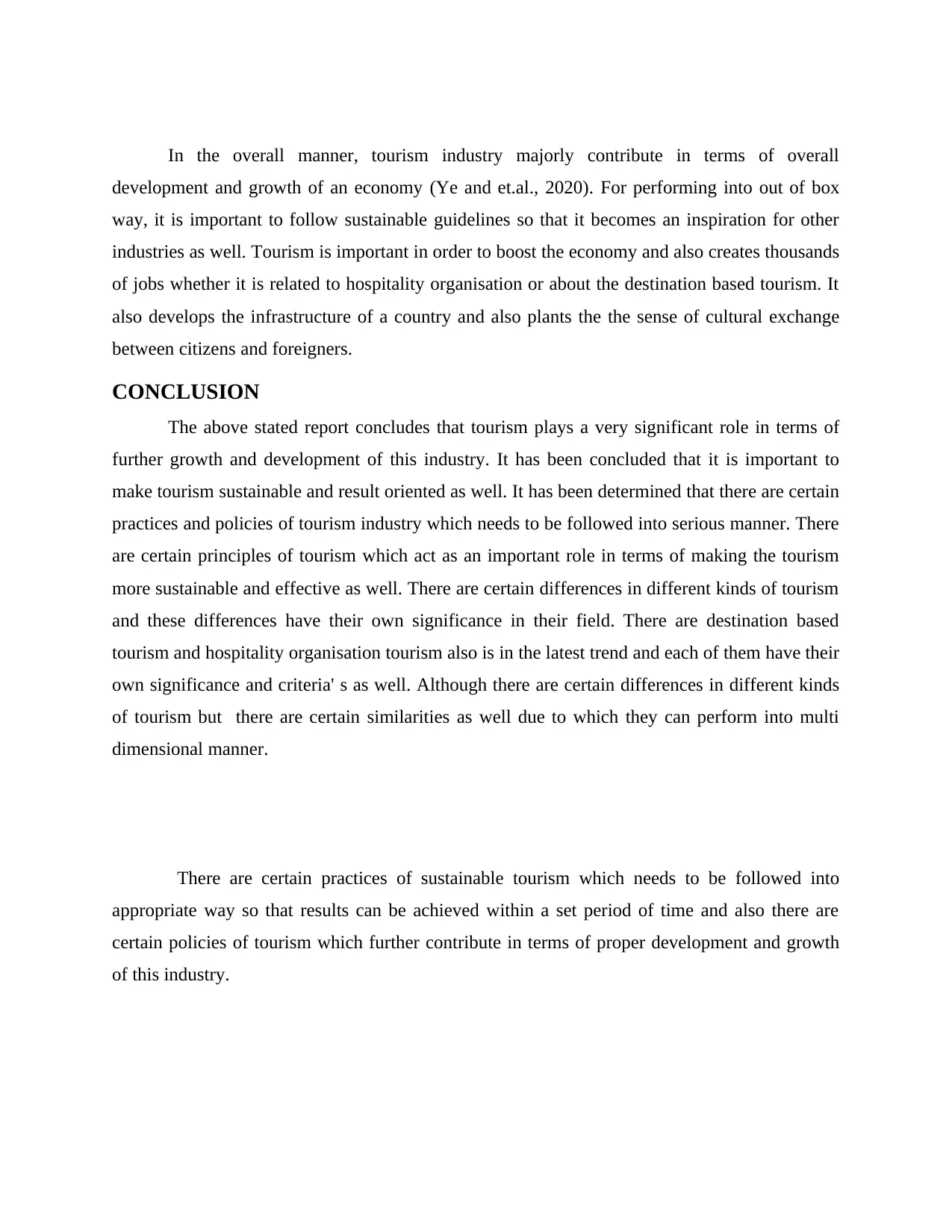
In the overall manner, tourism industry majorly contribute in terms of overall
development and growth of an economy (Ye and et.al., 2020). For performing into out of box
way, it is important to follow sustainable guidelines so that it becomes an inspiration for other
industries as well. Tourism is important in order to boost the economy and also creates thousands
of jobs whether it is related to hospitality organisation or about the destination based tourism. It
also develops the infrastructure of a country and also plants the the sense of cultural exchange
between citizens and foreigners.
CONCLUSION
The above stated report concludes that tourism plays a very significant role in terms of
further growth and development of this industry. It has been concluded that it is important to
make tourism sustainable and result oriented as well. It has been determined that there are certain
practices and policies of tourism industry which needs to be followed into serious manner. There
are certain principles of tourism which act as an important role in terms of making the tourism
more sustainable and effective as well. There are certain differences in different kinds of tourism
and these differences have their own significance in their field. There are destination based
tourism and hospitality organisation tourism also is in the latest trend and each of them have their
own significance and criteria' s as well. Although there are certain differences in different kinds
of tourism but there are certain similarities as well due to which they can perform into multi
dimensional manner.
There are certain practices of sustainable tourism which needs to be followed into
appropriate way so that results can be achieved within a set period of time and also there are
certain policies of tourism which further contribute in terms of proper development and growth
of this industry.
development and growth of an economy (Ye and et.al., 2020). For performing into out of box
way, it is important to follow sustainable guidelines so that it becomes an inspiration for other
industries as well. Tourism is important in order to boost the economy and also creates thousands
of jobs whether it is related to hospitality organisation or about the destination based tourism. It
also develops the infrastructure of a country and also plants the the sense of cultural exchange
between citizens and foreigners.
CONCLUSION
The above stated report concludes that tourism plays a very significant role in terms of
further growth and development of this industry. It has been concluded that it is important to
make tourism sustainable and result oriented as well. It has been determined that there are certain
practices and policies of tourism industry which needs to be followed into serious manner. There
are certain principles of tourism which act as an important role in terms of making the tourism
more sustainable and effective as well. There are certain differences in different kinds of tourism
and these differences have their own significance in their field. There are destination based
tourism and hospitality organisation tourism also is in the latest trend and each of them have their
own significance and criteria' s as well. Although there are certain differences in different kinds
of tourism but there are certain similarities as well due to which they can perform into multi
dimensional manner.
There are certain practices of sustainable tourism which needs to be followed into
appropriate way so that results can be achieved within a set period of time and also there are
certain policies of tourism which further contribute in terms of proper development and growth
of this industry.
Paraphrase This Document
Need a fresh take? Get an instant paraphrase of this document with our AI Paraphraser

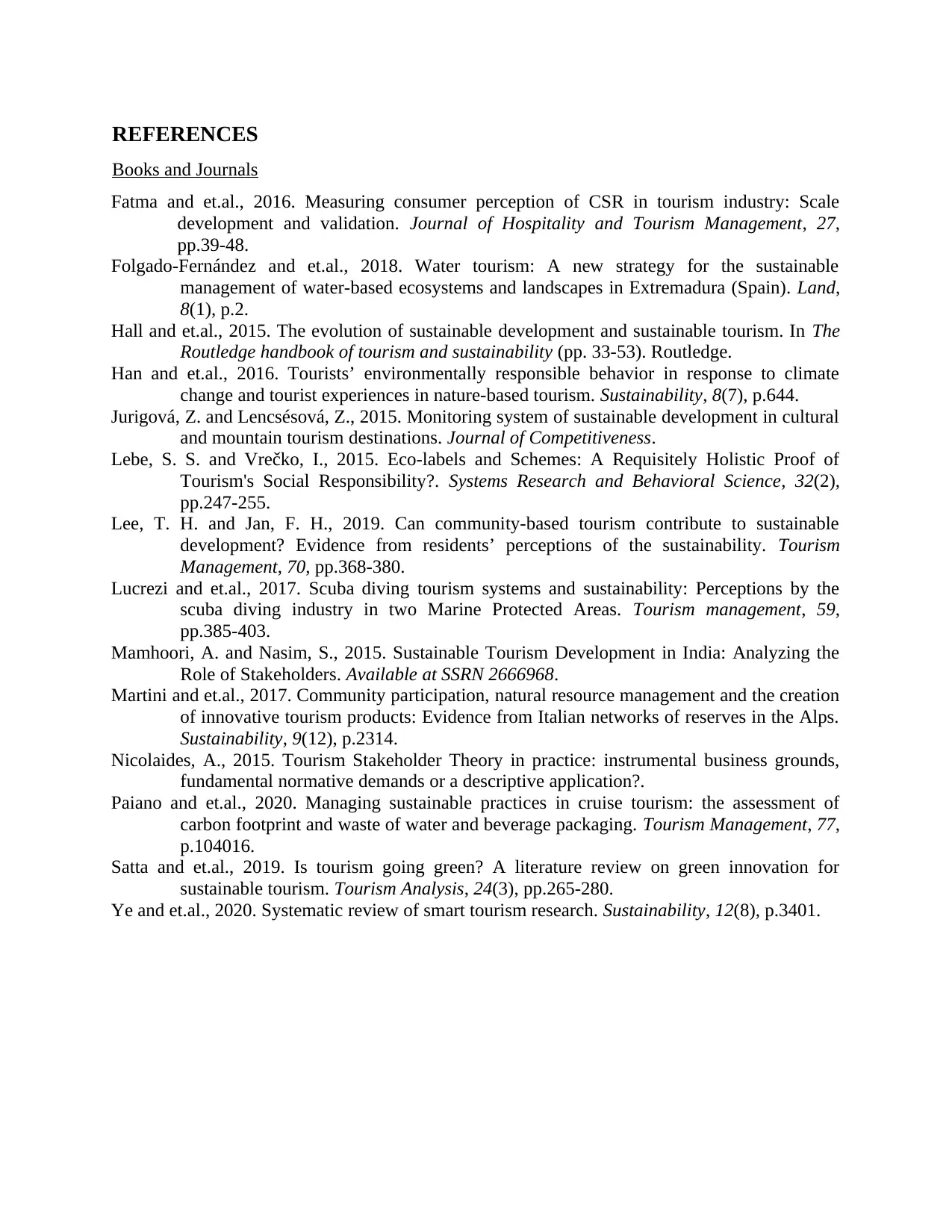
REFERENCES
Books and Journals
Fatma and et.al., 2016. Measuring consumer perception of CSR in tourism industry: Scale
development and validation. Journal of Hospitality and Tourism Management, 27,
pp.39-48.
Folgado-Fernández and et.al., 2018. Water tourism: A new strategy for the sustainable
management of water-based ecosystems and landscapes in Extremadura (Spain). Land,
8(1), p.2.
Hall and et.al., 2015. The evolution of sustainable development and sustainable tourism. In The
Routledge handbook of tourism and sustainability (pp. 33-53). Routledge.
Han and et.al., 2016. Tourists’ environmentally responsible behavior in response to climate
change and tourist experiences in nature-based tourism. Sustainability, 8(7), p.644.
Jurigová, Z. and Lencsésová, Z., 2015. Monitoring system of sustainable development in cultural
and mountain tourism destinations. Journal of Competitiveness.
Lebe, S. S. and Vrečko, I., 2015. Eco‐labels and Schemes: A Requisitely Holistic Proof of
Tourism's Social Responsibility?. Systems Research and Behavioral Science, 32(2),
pp.247-255.
Lee, T. H. and Jan, F. H., 2019. Can community-based tourism contribute to sustainable
development? Evidence from residents’ perceptions of the sustainability. Tourism
Management, 70, pp.368-380.
Lucrezi and et.al., 2017. Scuba diving tourism systems and sustainability: Perceptions by the
scuba diving industry in two Marine Protected Areas. Tourism management, 59,
pp.385-403.
Mamhoori, A. and Nasim, S., 2015. Sustainable Tourism Development in India: Analyzing the
Role of Stakeholders. Available at SSRN 2666968.
Martini and et.al., 2017. Community participation, natural resource management and the creation
of innovative tourism products: Evidence from Italian networks of reserves in the Alps.
Sustainability, 9(12), p.2314.
Nicolaides, A., 2015. Tourism Stakeholder Theory in practice: instrumental business grounds,
fundamental normative demands or a descriptive application?.
Paiano and et.al., 2020. Managing sustainable practices in cruise tourism: the assessment of
carbon footprint and waste of water and beverage packaging. Tourism Management, 77,
p.104016.
Satta and et.al., 2019. Is tourism going green? A literature review on green innovation for
sustainable tourism. Tourism Analysis, 24(3), pp.265-280.
Ye and et.al., 2020. Systematic review of smart tourism research. Sustainability, 12(8), p.3401.
Books and Journals
Fatma and et.al., 2016. Measuring consumer perception of CSR in tourism industry: Scale
development and validation. Journal of Hospitality and Tourism Management, 27,
pp.39-48.
Folgado-Fernández and et.al., 2018. Water tourism: A new strategy for the sustainable
management of water-based ecosystems and landscapes in Extremadura (Spain). Land,
8(1), p.2.
Hall and et.al., 2015. The evolution of sustainable development and sustainable tourism. In The
Routledge handbook of tourism and sustainability (pp. 33-53). Routledge.
Han and et.al., 2016. Tourists’ environmentally responsible behavior in response to climate
change and tourist experiences in nature-based tourism. Sustainability, 8(7), p.644.
Jurigová, Z. and Lencsésová, Z., 2015. Monitoring system of sustainable development in cultural
and mountain tourism destinations. Journal of Competitiveness.
Lebe, S. S. and Vrečko, I., 2015. Eco‐labels and Schemes: A Requisitely Holistic Proof of
Tourism's Social Responsibility?. Systems Research and Behavioral Science, 32(2),
pp.247-255.
Lee, T. H. and Jan, F. H., 2019. Can community-based tourism contribute to sustainable
development? Evidence from residents’ perceptions of the sustainability. Tourism
Management, 70, pp.368-380.
Lucrezi and et.al., 2017. Scuba diving tourism systems and sustainability: Perceptions by the
scuba diving industry in two Marine Protected Areas. Tourism management, 59,
pp.385-403.
Mamhoori, A. and Nasim, S., 2015. Sustainable Tourism Development in India: Analyzing the
Role of Stakeholders. Available at SSRN 2666968.
Martini and et.al., 2017. Community participation, natural resource management and the creation
of innovative tourism products: Evidence from Italian networks of reserves in the Alps.
Sustainability, 9(12), p.2314.
Nicolaides, A., 2015. Tourism Stakeholder Theory in practice: instrumental business grounds,
fundamental normative demands or a descriptive application?.
Paiano and et.al., 2020. Managing sustainable practices in cruise tourism: the assessment of
carbon footprint and waste of water and beverage packaging. Tourism Management, 77,
p.104016.
Satta and et.al., 2019. Is tourism going green? A literature review on green innovation for
sustainable tourism. Tourism Analysis, 24(3), pp.265-280.
Ye and et.al., 2020. Systematic review of smart tourism research. Sustainability, 12(8), p.3401.
⊘ This is a preview!⊘
Do you want full access?
Subscribe today to unlock all pages.

Trusted by 1+ million students worldwide
1 out of 14
Related Documents
Your All-in-One AI-Powered Toolkit for Academic Success.
+13062052269
info@desklib.com
Available 24*7 on WhatsApp / Email
![[object Object]](/_next/static/media/star-bottom.7253800d.svg)
Unlock your academic potential
Copyright © 2020–2026 A2Z Services. All Rights Reserved. Developed and managed by ZUCOL.


